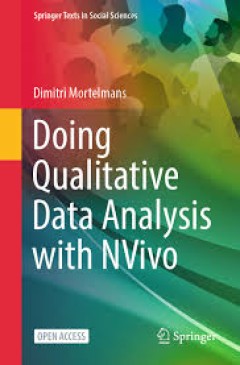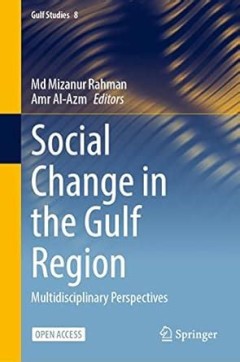Filter by

Doing Qualitative Data Analysis with NVivo
This open access textbook provides an introduction to the software program NVivo, the most widely used qualitative analysis program. It is a versatile program with an extensive range of accessible analysis tools, flexibly deployable in the diversity of qualitative analysis approaches. Qualitative analysis is almost standard practice today with the help of a software program. Yet there are ma…
- Edition
- 1
- ISBN/ISSN
- 978-3-031-66014-6
- Collation
- XVI, 282
- Series Title
- -
- Call Number
- -

Digitale Werkstätten: Technografische Perspektiven auf die Verwicklung von C…
Dieses Open-Access-Buch widmet sich der Frage, wie sich heterogene Gruppen von Fachkräften in Werkstätten für behinderte Menschen mittels einer komplexen digitalen Informationstechnologie koordinieren, orchestrieren und Informationen mobilisieren. In der Sozialen Arbeit kommen zunehmend solche verschachtelten und kooperativen Informationstechnologien, sogenannte Cyberinfrastrukturen, zum Ein…
- Edition
- 1
- ISBN/ISSN
- 978-3-658-47994-7
- Collation
- XVI, 466
- Series Title
- -
- Call Number
- -

Wissenschaft und Gesellschaft: Ein vertrauensvoller Dialog = Positionen und P…
Dieses Open-Access-Buch hat das Anliegen, das Zusammenspiel von Wissenschaft, Medien und Öffentlichkeit zu analysieren und nach Wegen zu suchen, es zu verbessern. Die Publikation wurde mit Mitteln der Daimler und Benz Stiftung, der Körber-Stiftung, der Stiftung Mercator sowie der VolkswagenStiftung gefördert und initiiert vom Arbeitskreis „Wissenschaft und Forschung“ des Bundesverbands D…
- Edition
- 1
- ISBN/ISSN
- 9783662594667
- Collation
- XIX, 295 hlm; ill., lamp.,
- Series Title
- -
- Call Number
- -

Die Praxis kollektiven Handelns
Dieses Open-Access-Buch präsentiert ein praxistheoretisches Konzept, das die Analyse verschiedener Aspekte und Formen kollektiven Handelns ermöglicht. Im Zentrum steht die Erweiterung des Handlungsverständnisses bei Anthony Giddens für Kollektive. Dabei werden Ansätze der Klassiker, der Organisations- und Bewegungsforschung sowie der jüngeren Debatten in Sozialtheorie und Philosophie inte…
- Edition
- 1
- ISBN/ISSN
- 9783658249458
- Collation
- X, 302 ill; lamp
- Series Title
- -
- Call Number
- -

Women's Empowerment and Public Policy in the Arab Gulf States :Exploring Chal…
This open access book explores the various dimensions of women’s empowerment in public policy in the Gulf Cooperation Council (GCC) region, with a particular focus on Qatar, comparing the country to the other Gulf states. Through its rich compilation of empirical qualitative research, the text unpacks the various ways in which women’s empowerment materializes in the GCC context, providing i…
- Edition
- 1
- ISBN/ISSN
- 9789819960064
- Collation
- XIV, 210: ill; lamp
- Series Title
- 11
- Call Number
- -

Social Change in the Gulf Region = Multidisciplinary Perspectives
This open access book, comprising thirty-nine chapters divided into social, cultural, economic, and political spheres, offers a unique opportunity to dive into the complex, dynamic, and sometimes contradictory transformation of Gulf societies in the last few decades. Whilst the Gulf region has at times been seen as impervious to this natural phenomenon of transformation—timeless, never changi…
- Edition
- 1
- ISBN/ISSN
- 9789811977961
- Collation
- XVI, 659 ill; lamp
- Series Title
- 8
- Call Number
- -

Doing Qualitative Data Analysis with NVivo
This open access textbook provides an introduction to the software program NVivo, the most widely used qualitative analysis program. It is a versatile program with an extensive range of accessible analysis tools, flexibly deployable in the diversity of qualitative analysis approaches. Qualitative analysis is almost standard practice today with the help of a software program. Yet there are many…
- Edition
- 1
- ISBN/ISSN
- 9783031660146
- Collation
- XVI, 282 hlm; ill., lamp.,
- Series Title
- -
- Call Number
- -

Partizipative Forschung = Ein Forschungsansatz für Gesundheit und seine Meth…
Dieser Open-Access-Sammelband bietet eine fundierte Grundlage für den Einstieg in die partizipative Forschung allgemein und in die Partizipative Gesundheitsforschung. Es werden Forschungsansätze und Methoden für die Erhebung und Auswertung in partizipativen Forschungsprozessen vorgestellt und anhand von Beispielstudien diskutiert. Partizipativ forschen heißt, die Menschen, deren Lebens- und…
- Edition
- 1
- ISBN/ISSN
- 9783658303617
- Collation
- XII, 262 ill; lamp
- Series Title
- -
- Call Number
- -

Research Ethics for Students in the Social Sciences
This open access textbook offers a practical guide into research ethics for undergraduate students in the social sciences. A step-by-step approach of the most viable issues, in-depth discussions of case histories and a variety of didactical tools will aid the student to grasp the issues at hand and help him or her develop strategies to deal with them. This book addresses problems and questions…
- Edition
- 1
- ISBN/ISSN
- 9783030484156
- Collation
- XVI, 287 ill; lamp
- Series Title
- -
- Call Number
- -

Secularization and China's Modernization
This open access book examines from the perspective of secularization. Since the publication of Max Weber's Protestant Ethics and the Spirit of Capitalism, how to realize modernization in developing countries has become an urgent problem to be demonstrated. Secularization has becoming endogenous power for Chinese modernization procedure, especially since 1978. However, to understand the foundat…
- Edition
- 1
- ISBN/ISSN
- 9789819780624
- Collation
- XI, 402 hlm; ill., lamp.,
- Series Title
- -
- Call Number
- -
 Computer Science, Information & General Works
Computer Science, Information & General Works  Philosophy & Psychology
Philosophy & Psychology  Religion
Religion  Social Sciences
Social Sciences  Language
Language  Pure Science
Pure Science  Applied Sciences
Applied Sciences  Art & Recreation
Art & Recreation  Literature
Literature  History & Geography
History & Geography